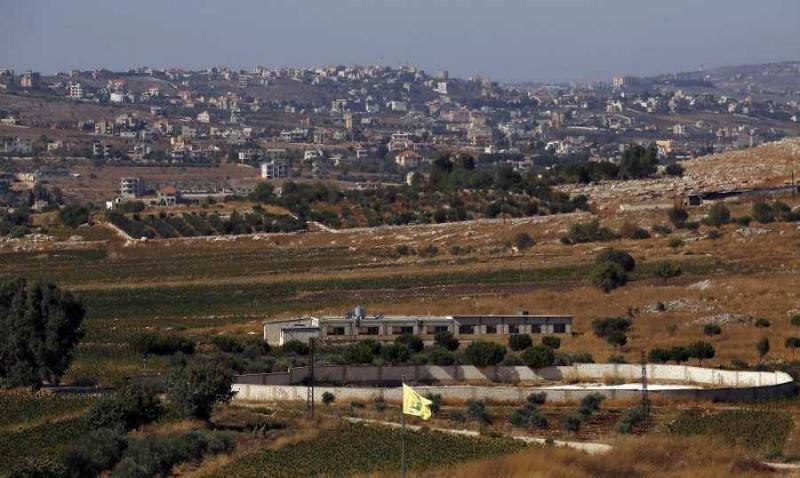U.S. Energy Advisor Amos Hochstein is preparing to return to Beirut in the first half of January to mediate between Lebanon and Israel to determine the land boundaries between the two countries. This was confirmed by the U.S. Ambassador to Lebanon, Dorothy Shea, who is leaving Beirut today after completing her term to take up her new position at the United Nations. The "Sharq Al-Awsat" learned from high-level Lebanese political sources that Shea informed the leaders she met during her farewell tour about the date of the U.S. envoy's return to Beirut, in a new attempt to revive U.S. mediation to define the Lebanese-Israeli land borders.
The political sources confirmed that Shea emphasized the need to de-escalate tensions to prevent the war from extending from Gaza to southern Lebanon, without hiding her concerns about the escalating confrontation between Hezbollah and Israel in southern Lebanon, even though Washington is pressuring to prevent an expansion that could impede the U.S. mediator's mission, so that he does not have to move between Beirut and Tel Aviv to reduce tension levels, lest his mediation become hostage to hot diplomacy marked by the exchange of missile messages between the two parties.
Shea focused in her farewell meetings on the necessity of cooperation to create favorable political conditions for implementing UN Resolution 1701. She stated that, at least from her perspective, she does not see an issue with defining the land borders between Lebanon and Israel, starting with the 13 points that the Lebanese government previously reserved, under the pretext that Israel still occupies parts of Lebanese territory, refusing to recognize the Blue Line as the comprehensive withdrawal line unless Israel withdraws from these points.
The same sources quoted Shea saying that meetings held at the headquarters of the UN peacekeeping forces "UNIFIL" in the town of Naqoura, under her sponsorship, between Lebanese and Israeli military delegations had resolved the dispute over 7 out of the 13 points that the Lebanese government had previously reserved, leaving only 6 points along the Lebanese border from Ras al-Naqoura to the outskirts of the occupied Shebaa Farms.
She confirmed that de-escalating the situation along the front could lead to a resolution of the dispute over the remaining points. She mentioned that Hochstein's achievement of a ceasefire that remains pending and unimplemented, as stipulated in Resolution 1701, could contribute, along with the cessation of military operations, to creating a secure and political atmosphere for searching for a solution for the Shebaa Farms.
She added that Washington has never stated, not even once, that the Shebaa Farms are under Israeli sovereignty and treats them as Lebanese territory, provided that Syria recognizes and acknowledges them. She sees that it is possible to reach an understanding that allows Lebanon to regain its sovereignty over them, perhaps by expanding the tasks of international troops to include annexing them, unlike the Lebanese part of the town of Ghajar.
The problem preventing Lebanon from regaining control over the area, according to Shea, is that its residents are Lebanese; however, they refuse to affiliate their town with Lebanese sovereignty since they benefit from Israeli services after obtaining Israeli passports, allowing most of them to work and some to travel abroad.
The question remains: How can the U.S. mediator act to reach an agreement between Lebanon and Israel to define the borders between the two countries, amid a front that threatens further escalation which risks expanding the war similar to that occurring in the Gaza Strip, which will inevitably disrupt the U.S. mediation, as long as Hezbollah continues to support Hamas and prioritizes a ceasefire in Gaza, even if so far it is not inclined to expand the war unless Israel initiates it?
This question also applies to the caretaker government, in light of its Prime Minister Najib Mikati affirming Lebanon’s commitment to implementing Resolution 1701, which will not come to fruition unless Israel ceases its assaults on Lebanon, continues to violate its airspace by land, sea, and air, and carves out areas of Lebanese territory, obligating it to adhere to the entire text and stipulations of the armistice agreement, indicating Lebanon's outright refusal even to engage in modifying the international resolution.
The clarity of the official Lebanese position opens the door to questions regarding Hezbollah's response to U.S. mediation, similar to the facilitation it provided to the U.S. mediator that led to the border demarcation agreement between Lebanon and Israel, although it previously claimed to stand behind the decisions made by the Lebanese state in this regard.
In this context, a European diplomatic source indicates that there is a need to restore the significance of Resolution 1701 by creating the conducive atmosphere for its implementation to prevent the situation in the south from slipping into a wider war. He confirms to "Sharq Al-Awsat" that military escalation, even if it suggests the front is on the edge of chaos, does not serve the party's interest in initiating an escalation that is hard to control.
Another question remains: Does Iran have an interest in hastily moving forward, prompting its primary ally in the region, Hezbollah, to squander its excess power in anticipation of the situation in Gaza, whether politically or militarily? Or is it being cautious of all possibilities and avoiding entering a war prematurely, especially since it is linked to the outcome of the war in Gaza and Lebanon's ability to bear the cost and absorb its repercussions at all levels amidst the deterioration of its economic and financial situation and the political stalemate regarding the election of a president?




